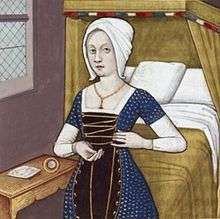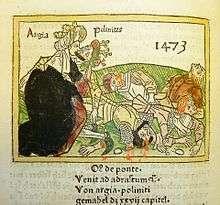Argia of Argos
In Greek mythology, Argia /ɑːrˈdʒaɪə/ or Argea /ɑːrˈdʒiːə/ (Ancient Greek: Ἀργεία Argeia) was a daughter of King Adrastus of Argos, and of Amphithea, daughter of Pronax. She was married to Polynices, the exiled king of Thebes, and bore him three sons: Thersander, Adrastus, and Timeas.[1][2][3][4]

Mythology

When Oedipus had died at Thebes, Argea came with others to the funeral of Oedipus, her father-in-law.[5] After their father's death, Polynices was to rule Thebes with his brother Eteocles on alternating years. Eteocles ruled the first year. When the year was over for Eteocles, Polynices demanded the rule. Eteocles refused to yield it and so Polynices sought out help from King Adrastus. Polynices begged an army from King Adrastus for recovering his father's kingdom from his brother Eteocles. King Adrastus not only gave an army but set out himself with six other leaders, since Thebes had seven gates that protected the city. The Seven Against Thebes set out to battle against the army of Thebes headed by Eteocles. Polynices and Eteocles killed each other in a fight among themselves in the ensuing battle.
Argia set out with others to find her beloved husband among the many lying rotting in the battlefield, in spite of a decree by King Creon forbidding such, on pain of capital punishment. She searched until she found him. Argia tried to revive him with kisses and tears, however all her efforts were in vain. She then had his body cremated and placed the ashes in an urn. Her virtuous acts showed the genuine love she had for her husband.
Middle Age tradition
She is remembered in De Mulieribus Claris, a collection of biographies of historical and mythological women by the Florentine author Giovanni Boccaccio, composed in 1361–62. It is notable as the first collection devoted exclusively to biographies of women in Western literature.[6].
See also
- Phoenician Women
- Hyginus, who in his Fabulae (Latin) calls her Argia.
- Robert Graves in his popular The Greek Myths (106c) prefers the spelling Aegeia.
- Euripides in The Phoenician Women and Suppliants, who mentions the wedding without giving her name.
References
- Hyginus. Fabulae, 69 - 70
- Pausanias, Description of Greece, 2.20.5
- Pseudo-Apollodorus. Bibliotheca, 1.9.13 & 3.6.1
- Hesiod, Catalogue of Women, fragment 99a
- Scholiast on Homer, Il. xxiii. 679; Hesiod. Catalogue of Women Fragment 24.
- Boccaccio (2003), p. xi
Sources
- Statius, Thebais IV.187–213